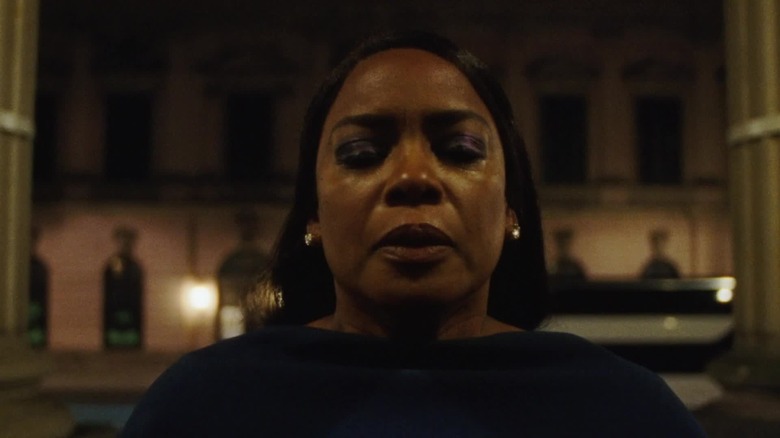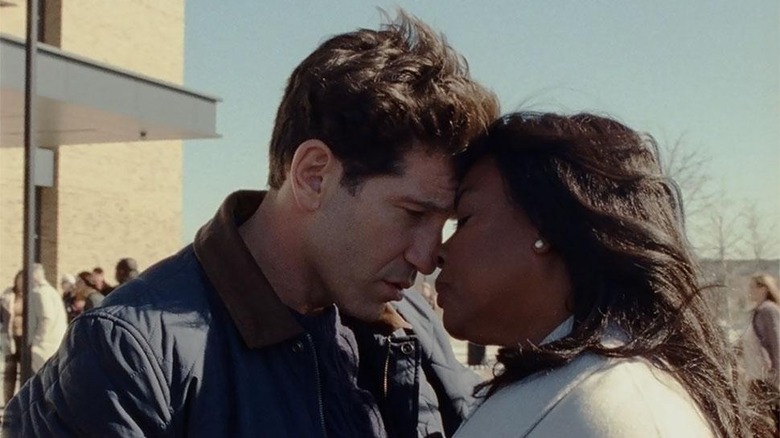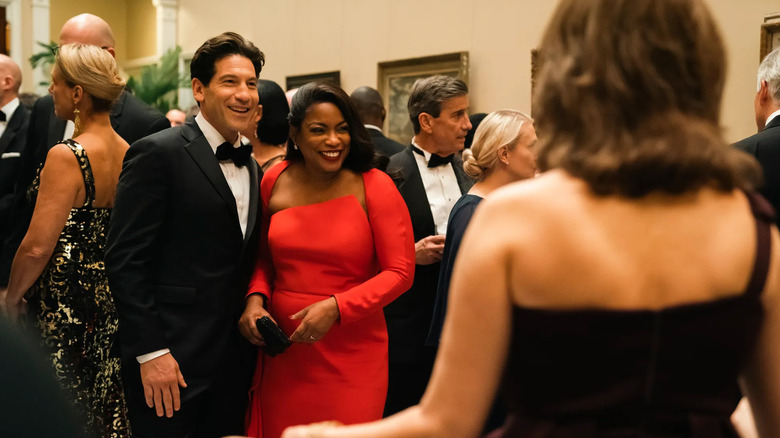Origin Review: Ava DuVernay's Audacious Adaptation Loses The Thread
"You'll sit through three hours of [Oppenheimer's] process," observed "Origin" director Ava DuVernay. "Will you sit through two hours of [subject Isabel Wilkerson's] process?" She suggested in a slightly playful provocation, but it's worth unpacking some of the similarities. Both "Oppenheimer" and "Origin" are films about great thinkers and scholars who formulate groundbreaking ideas. Each has the power to change the future by reconstructing how people formulate the past.
For author Isabel Wilkerson, brought to life in "Origin" by Aunjanue Ellis-Taylor, her ability to locate patterns of discrimination across time and borders leads to a new working theory of society. Her framework unites the plight of Dalits in India, Jews in Nazi Germany, and Blacks in the United States, though not without some pushback among her peers. A hierarchy of caste supersedes all other categories of identity, uniting all people in a global strife against unjust oppression.
DuVernay correctly recognizes that an idea of this magnitude requires more than the standard documentary treatment she gave in "13th" to Oscar-nominated effect. Caste is simultaneously so big and yet so intimate. Subjugators throughout history recognize the power of caste's vastness to discourage people from taking action to dismantle it. Conversely, the quickest way to make anyone realize the arbitrariness of the system is to highlight how individual people constitute groups. The filmmaker takes that spirit and runs with it in concept, translating macro to micro with mixed results in execution.
The micro and the macro
Rather than directly adapting Wilkerson's best-selling 2020 tome "Caste: The Origin of Our Discontents," DuVernay goes a more oblique and expansive route in her transposition from page to screen. "Origin" refers not only to the root of discontent but to the book itself as it tracks Wilkerson's thesis from genesis to germination. That story encompasses the journey of researching and publishing such a comprehensive text. But it also takes time to portray Wilkerson just existing as a wife, daughter, and devoted family member irrespective of her work.
It's not hard to see DuVernay finding this entry point given the shared creative kinship with her subject. Some of the film's best scenes involve turning behind the scenes with whiteboards and endless staring at a laptop screen into high-stakes cinema. But that ability to manage the human dimension of "Origin" largely stops at the source. The narrative elements that DuVernay brings to bear do more to hinder than help the processing of Wilkerson's ideas.
At least on paper, the film's riskiest moments are scenes involving Wilkerson's family with no direct bearing on her writing. They prove to be the best parts of "Origin" because DuVernay can make them more casual and comfortable. Their highlight is Wilkerson's cousin Marion (Niecy Nash-Betts), who provides both necessary comic relief and a convenient reason for the author to translate her thinking into layman's terms.
The strategy falls flat when dramatizing historical incidents of people squirming with the heavy thumb of the caste system. Each major social structure Wilkerson examines gets a corresponding narrative to depict how institutional forces impact individual lives. Despite featuring strong actors like Jasmine Cephas Jones and Finn Wittrock to bring these capsule stories to life, these episodic bits feel made for a museum. These people are seen far more than they are heard because DuVernay leaves Ellis-Taylor to narrate them. Having Wilkerson's nuanced examination play over them only serves to underscore how flimsy the recreations are.
Sense of scale
Perhaps it's unfair to expect anyone to match the crispness of a Pulitzer Prize winner's prose. But DuVernay's increasing deference to simply speaking her words, especially as the film draws to a close, highlights the ways the film misses the mark on matching her brilliance. "Origin" lacks both a center of gravity and a sense of scale. The film's most showstopping scene comes not from some magnificent intellectual synthesis. Instead, it's courtesy of the inimitable Audra McDonald delivering a monologue about a moment of racism seared into her brain. But the moment comes and goes, stalling narrative momentum even as it adds needed emphasis.
DuVernay never quite finesses that sliding scale between the personal and the political so brilliantly expressed in Wilkerson's work. She's quick to lean on symbols — iced tea and Skittles purchased by Trayvon Martin, the MAGA hat worn by a taciturn plumber (Nick Offerman) — and suffering for immediate visceral impact. Between this reductive visual language and the tendency toward just letting her incarnation of Isabel Wilkerson lecture at the audience, "Origin" runs counter to her humanistic intentions in making the movie. The author knows where people fit in this story. It's not evident from this patchwork that the filmmaker does.
DuVernay ultimately uses "Caste" as more of a crutch than a guide in her exploration of historical injustice. When in doubt, she lets Wilkerson air it out. Thanks to the high production value a director like DuVernay offers, introductory-level sociology classes just got some compelling new content for professors to clip in their lectures. This is a valid, noble purpose for a sequence in any film to fulfill. It's just that DuVernay clearly also had a higher one in mind.
/Film rating: 5.5 out of 10


